Analysis of Deloitte's International Management and Culture Issues
VerifiedAdded on 2023/01/05
|6
|1256
|100
Report
AI Summary
This report delves into the international management practices of Deloitte, a prominent UK-based consultancy firm, with a focus on how regional cultural issues affect its organizational culture and operations across countries like Japan, Germany, and Brazil. The report identifies key challenges such as language differences, varying mindsets and mentalities, resource organization difficulties, and differing ethical and legal considerations across regions. It also discusses the impact of local business practices, lack of trust, and cultural influences on client loyalty. The conclusion emphasizes the need for Deloitte to adopt strategic approaches to navigate these cultural complexities and leverage opportunities in the international market, such as the increasing openness of countries to foreign investment, to enhance its profitability and client base. The report underscores the importance of thorough cultural analysis and strategic planning for successful international business operations.
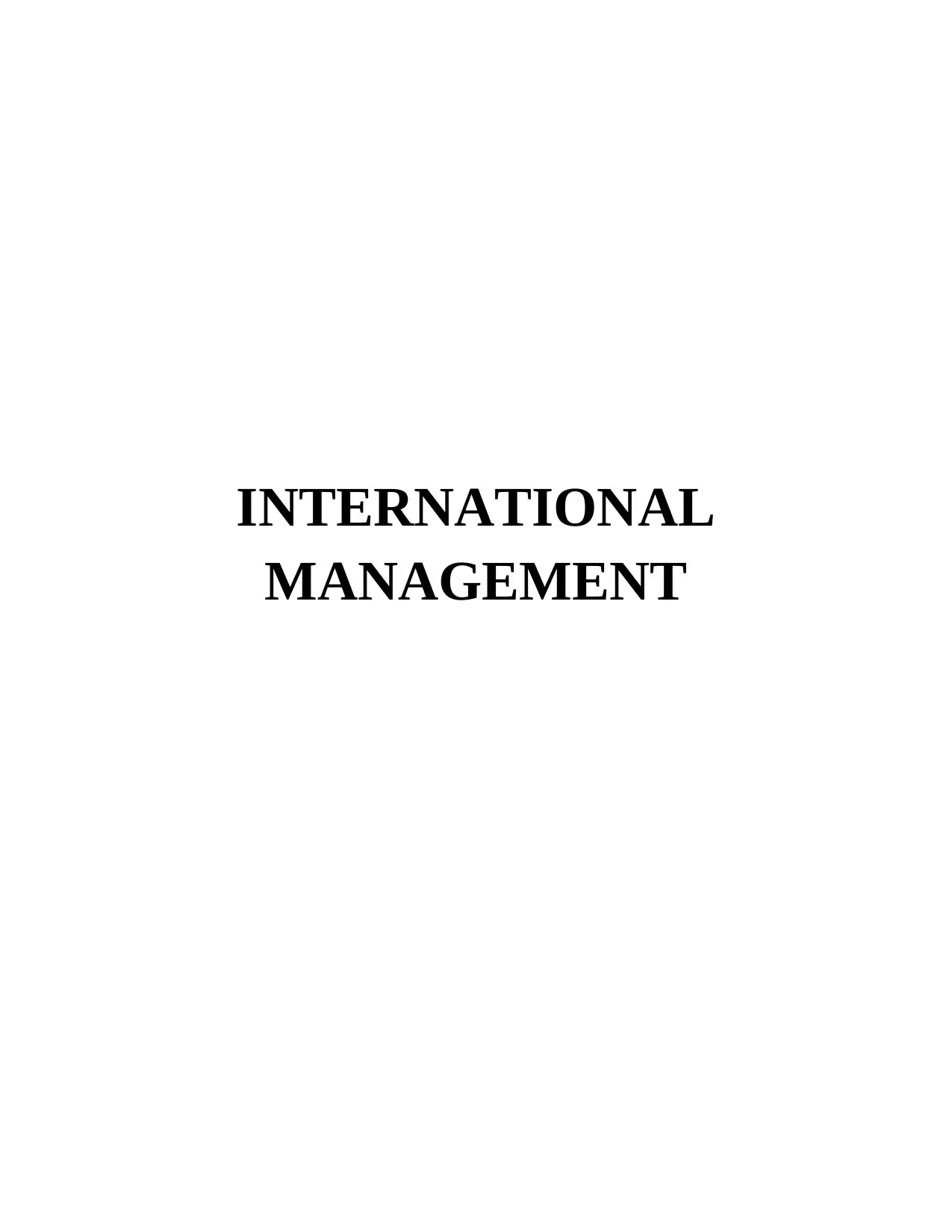
INTERNATIONAL
MANAGEMENT
MANAGEMENT
Paraphrase This Document
Need a fresh take? Get an instant paraphrase of this document with our AI Paraphraser
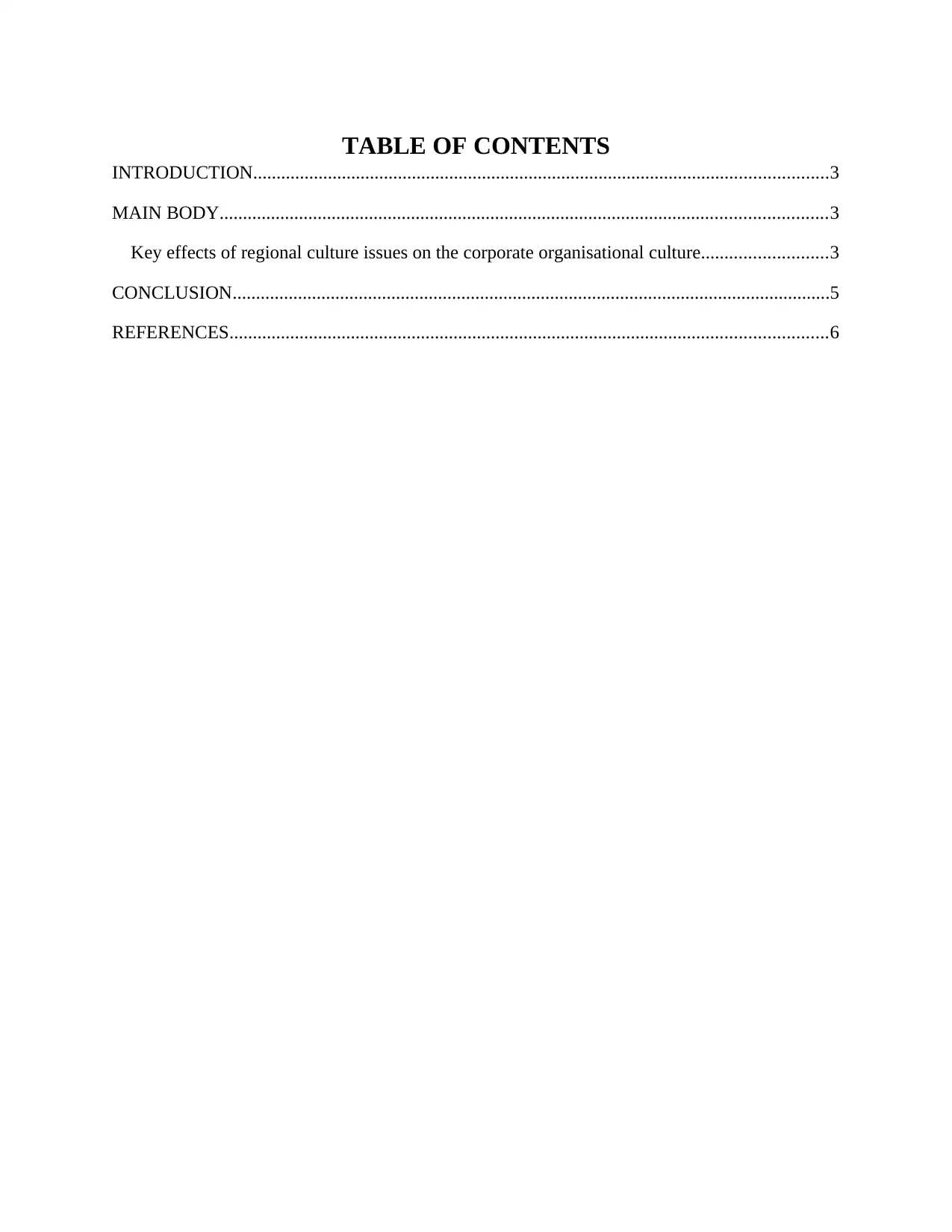
TABLE OF CONTENTS
INTRODUCTION...........................................................................................................................3
MAIN BODY..................................................................................................................................3
Key effects of regional culture issues on the corporate organisational culture...........................3
CONCLUSION................................................................................................................................5
REFERENCES................................................................................................................................6
INTRODUCTION...........................................................................................................................3
MAIN BODY..................................................................................................................................3
Key effects of regional culture issues on the corporate organisational culture...........................3
CONCLUSION................................................................................................................................5
REFERENCES................................................................................................................................6
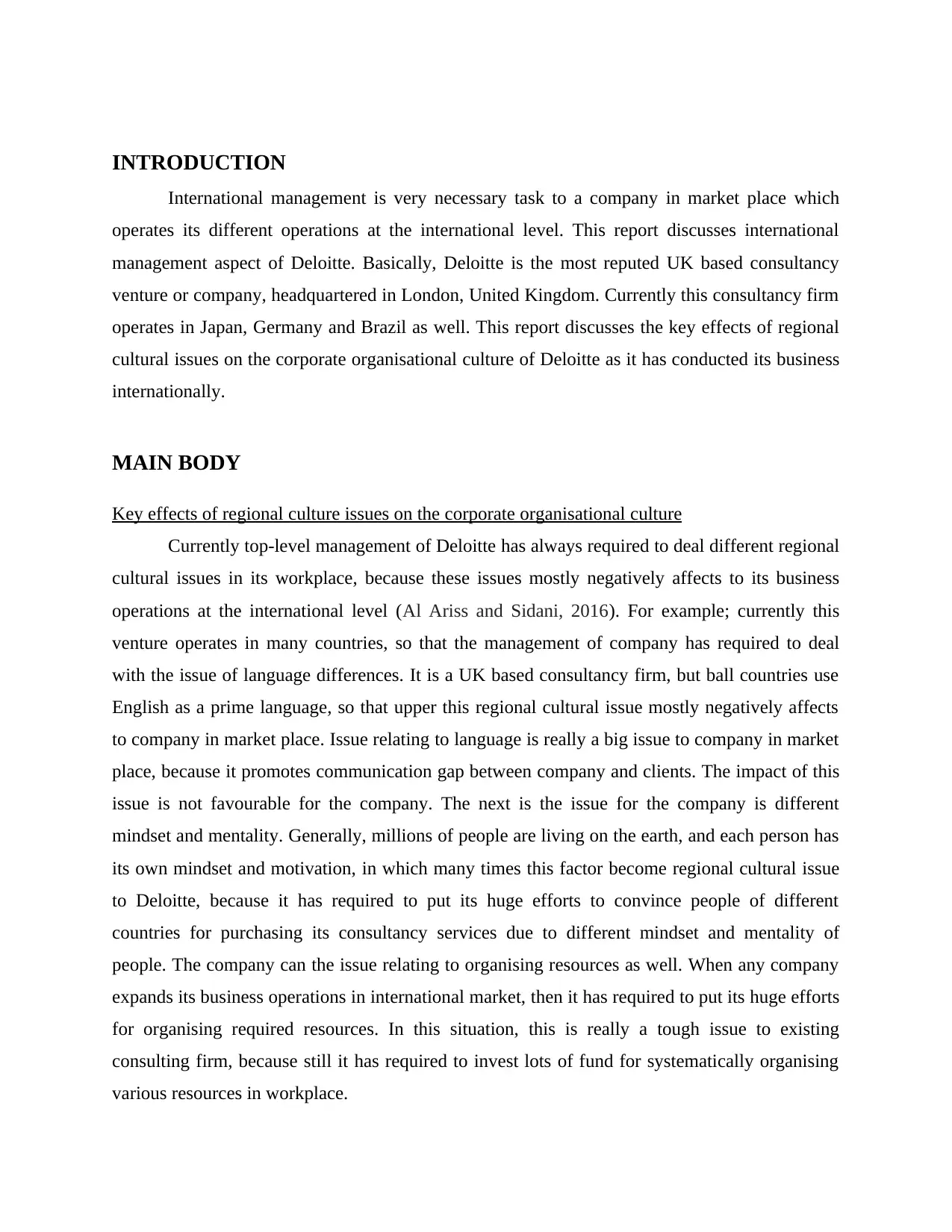
INTRODUCTION
International management is very necessary task to a company in market place which
operates its different operations at the international level. This report discusses international
management aspect of Deloitte. Basically, Deloitte is the most reputed UK based consultancy
venture or company, headquartered in London, United Kingdom. Currently this consultancy firm
operates in Japan, Germany and Brazil as well. This report discusses the key effects of regional
cultural issues on the corporate organisational culture of Deloitte as it has conducted its business
internationally.
MAIN BODY
Key effects of regional culture issues on the corporate organisational culture
Currently top-level management of Deloitte has always required to deal different regional
cultural issues in its workplace, because these issues mostly negatively affects to its business
operations at the international level (Al Ariss and Sidani, 2016). For example; currently this
venture operates in many countries, so that the management of company has required to deal
with the issue of language differences. It is a UK based consultancy firm, but ball countries use
English as a prime language, so that upper this regional cultural issue mostly negatively affects
to company in market place. Issue relating to language is really a big issue to company in market
place, because it promotes communication gap between company and clients. The impact of this
issue is not favourable for the company. The next is the issue for the company is different
mindset and mentality. Generally, millions of people are living on the earth, and each person has
its own mindset and motivation, in which many times this factor become regional cultural issue
to Deloitte, because it has required to put its huge efforts to convince people of different
countries for purchasing its consultancy services due to different mindset and mentality of
people. The company can the issue relating to organising resources as well. When any company
expands its business operations in international market, then it has required to put its huge efforts
for organising required resources. In this situation, this is really a tough issue to existing
consulting firm, because still it has required to invest lots of fund for systematically organising
various resources in workplace.
International management is very necessary task to a company in market place which
operates its different operations at the international level. This report discusses international
management aspect of Deloitte. Basically, Deloitte is the most reputed UK based consultancy
venture or company, headquartered in London, United Kingdom. Currently this consultancy firm
operates in Japan, Germany and Brazil as well. This report discusses the key effects of regional
cultural issues on the corporate organisational culture of Deloitte as it has conducted its business
internationally.
MAIN BODY
Key effects of regional culture issues on the corporate organisational culture
Currently top-level management of Deloitte has always required to deal different regional
cultural issues in its workplace, because these issues mostly negatively affects to its business
operations at the international level (Al Ariss and Sidani, 2016). For example; currently this
venture operates in many countries, so that the management of company has required to deal
with the issue of language differences. It is a UK based consultancy firm, but ball countries use
English as a prime language, so that upper this regional cultural issue mostly negatively affects
to company in market place. Issue relating to language is really a big issue to company in market
place, because it promotes communication gap between company and clients. The impact of this
issue is not favourable for the company. The next is the issue for the company is different
mindset and mentality. Generally, millions of people are living on the earth, and each person has
its own mindset and motivation, in which many times this factor become regional cultural issue
to Deloitte, because it has required to put its huge efforts to convince people of different
countries for purchasing its consultancy services due to different mindset and mentality of
people. The company can the issue relating to organising resources as well. When any company
expands its business operations in international market, then it has required to put its huge efforts
for organising required resources. In this situation, this is really a tough issue to existing
consulting firm, because still it has required to invest lots of fund for systematically organising
various resources in workplace.
⊘ This is a preview!⊘
Do you want full access?
Subscribe today to unlock all pages.

Trusted by 1+ million students worldwide
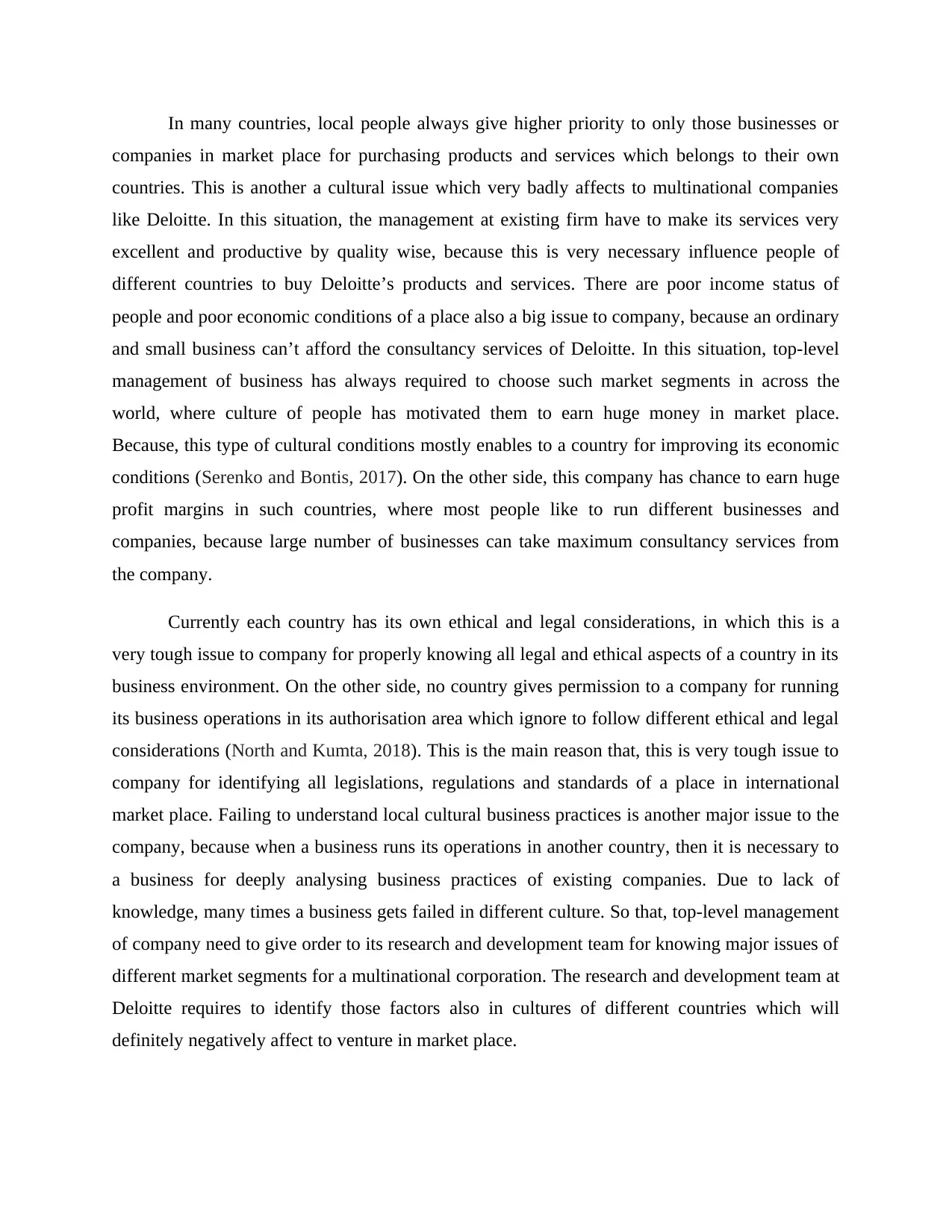
In many countries, local people always give higher priority to only those businesses or
companies in market place for purchasing products and services which belongs to their own
countries. This is another a cultural issue which very badly affects to multinational companies
like Deloitte. In this situation, the management at existing firm have to make its services very
excellent and productive by quality wise, because this is very necessary influence people of
different countries to buy Deloitte’s products and services. There are poor income status of
people and poor economic conditions of a place also a big issue to company, because an ordinary
and small business can’t afford the consultancy services of Deloitte. In this situation, top-level
management of business has always required to choose such market segments in across the
world, where culture of people has motivated them to earn huge money in market place.
Because, this type of cultural conditions mostly enables to a country for improving its economic
conditions (Serenko and Bontis, 2017). On the other side, this company has chance to earn huge
profit margins in such countries, where most people like to run different businesses and
companies, because large number of businesses can take maximum consultancy services from
the company.
Currently each country has its own ethical and legal considerations, in which this is a
very tough issue to company for properly knowing all legal and ethical aspects of a country in its
business environment. On the other side, no country gives permission to a company for running
its business operations in its authorisation area which ignore to follow different ethical and legal
considerations (North and Kumta, 2018). This is the main reason that, this is very tough issue to
company for identifying all legislations, regulations and standards of a place in international
market place. Failing to understand local cultural business practices is another major issue to the
company, because when a business runs its operations in another country, then it is necessary to
a business for deeply analysing business practices of existing companies. Due to lack of
knowledge, many times a business gets failed in different culture. So that, top-level management
of company need to give order to its research and development team for knowing major issues of
different market segments for a multinational corporation. The research and development team at
Deloitte requires to identify those factors also in cultures of different countries which will
definitely negatively affect to venture in market place.
companies in market place for purchasing products and services which belongs to their own
countries. This is another a cultural issue which very badly affects to multinational companies
like Deloitte. In this situation, the management at existing firm have to make its services very
excellent and productive by quality wise, because this is very necessary influence people of
different countries to buy Deloitte’s products and services. There are poor income status of
people and poor economic conditions of a place also a big issue to company, because an ordinary
and small business can’t afford the consultancy services of Deloitte. In this situation, top-level
management of business has always required to choose such market segments in across the
world, where culture of people has motivated them to earn huge money in market place.
Because, this type of cultural conditions mostly enables to a country for improving its economic
conditions (Serenko and Bontis, 2017). On the other side, this company has chance to earn huge
profit margins in such countries, where most people like to run different businesses and
companies, because large number of businesses can take maximum consultancy services from
the company.
Currently each country has its own ethical and legal considerations, in which this is a
very tough issue to company for properly knowing all legal and ethical aspects of a country in its
business environment. On the other side, no country gives permission to a company for running
its business operations in its authorisation area which ignore to follow different ethical and legal
considerations (North and Kumta, 2018). This is the main reason that, this is very tough issue to
company for identifying all legislations, regulations and standards of a place in international
market place. Failing to understand local cultural business practices is another major issue to the
company, because when a business runs its operations in another country, then it is necessary to
a business for deeply analysing business practices of existing companies. Due to lack of
knowledge, many times a business gets failed in different culture. So that, top-level management
of company need to give order to its research and development team for knowing major issues of
different market segments for a multinational corporation. The research and development team at
Deloitte requires to identify those factors also in cultures of different countries which will
definitely negatively affect to venture in market place.
Paraphrase This Document
Need a fresh take? Get an instant paraphrase of this document with our AI Paraphraser
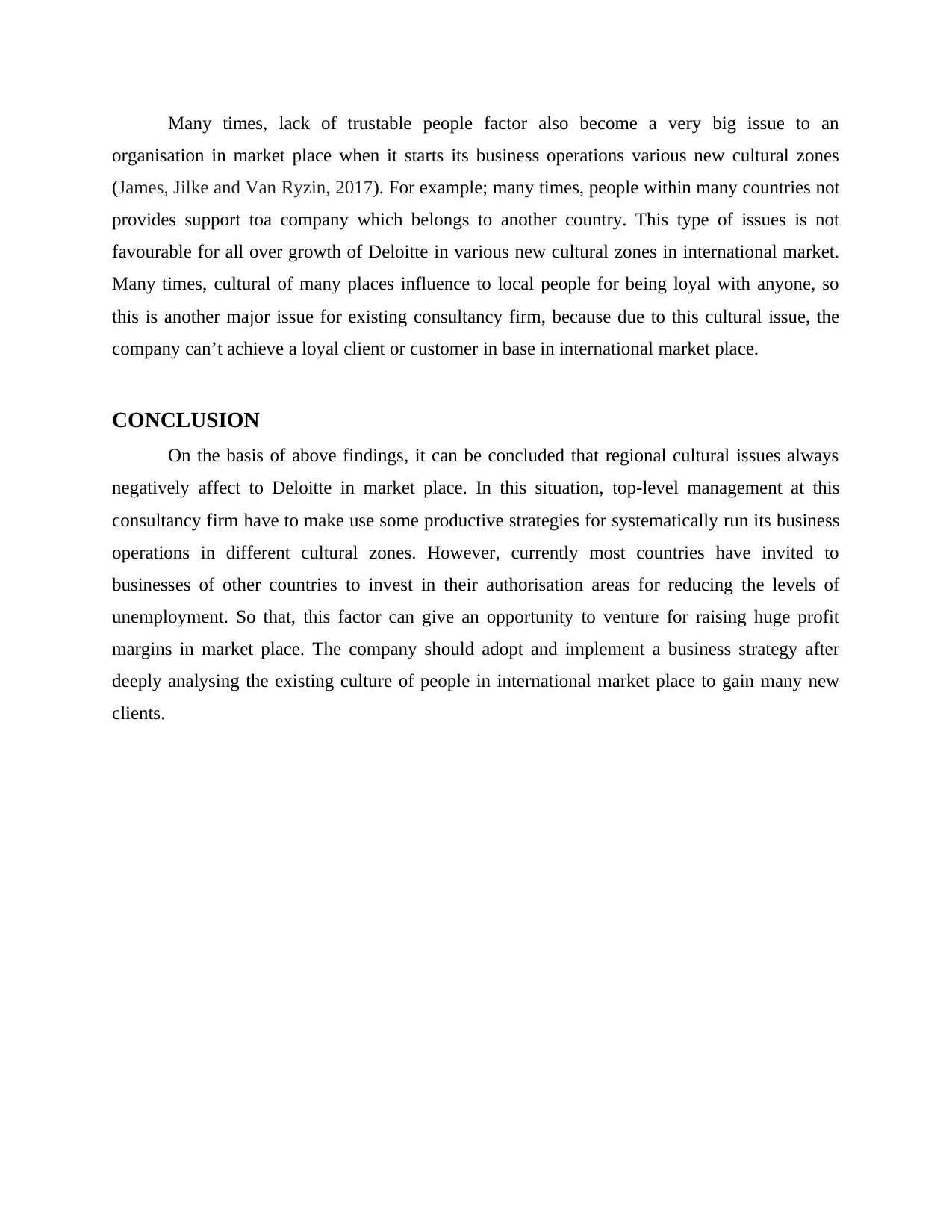
Many times, lack of trustable people factor also become a very big issue to an
organisation in market place when it starts its business operations various new cultural zones
(James, Jilke and Van Ryzin, 2017). For example; many times, people within many countries not
provides support toa company which belongs to another country. This type of issues is not
favourable for all over growth of Deloitte in various new cultural zones in international market.
Many times, cultural of many places influence to local people for being loyal with anyone, so
this is another major issue for existing consultancy firm, because due to this cultural issue, the
company can’t achieve a loyal client or customer in base in international market place.
CONCLUSION
On the basis of above findings, it can be concluded that regional cultural issues always
negatively affect to Deloitte in market place. In this situation, top-level management at this
consultancy firm have to make use some productive strategies for systematically run its business
operations in different cultural zones. However, currently most countries have invited to
businesses of other countries to invest in their authorisation areas for reducing the levels of
unemployment. So that, this factor can give an opportunity to venture for raising huge profit
margins in market place. The company should adopt and implement a business strategy after
deeply analysing the existing culture of people in international market place to gain many new
clients.
organisation in market place when it starts its business operations various new cultural zones
(James, Jilke and Van Ryzin, 2017). For example; many times, people within many countries not
provides support toa company which belongs to another country. This type of issues is not
favourable for all over growth of Deloitte in various new cultural zones in international market.
Many times, cultural of many places influence to local people for being loyal with anyone, so
this is another major issue for existing consultancy firm, because due to this cultural issue, the
company can’t achieve a loyal client or customer in base in international market place.
CONCLUSION
On the basis of above findings, it can be concluded that regional cultural issues always
negatively affect to Deloitte in market place. In this situation, top-level management at this
consultancy firm have to make use some productive strategies for systematically run its business
operations in different cultural zones. However, currently most countries have invited to
businesses of other countries to invest in their authorisation areas for reducing the levels of
unemployment. So that, this factor can give an opportunity to venture for raising huge profit
margins in market place. The company should adopt and implement a business strategy after
deeply analysing the existing culture of people in international market place to gain many new
clients.
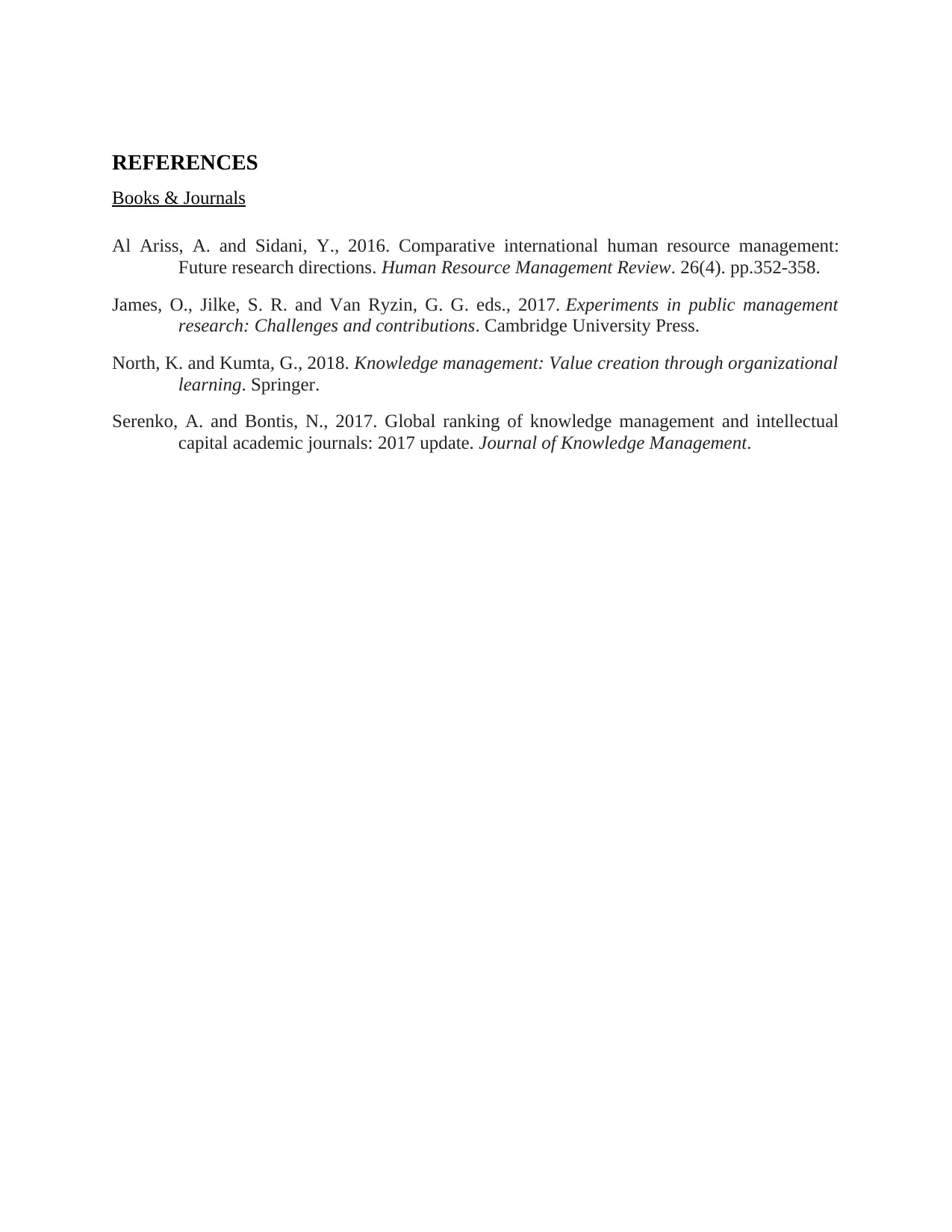
REFERENCES
Books & Journals
Al Ariss, A. and Sidani, Y., 2016. Comparative international human resource management:
Future research directions. Human Resource Management Review. 26(4). pp.352-358.
James, O., Jilke, S. R. and Van Ryzin, G. G. eds., 2017. Experiments in public management
research: Challenges and contributions. Cambridge University Press.
North, K. and Kumta, G., 2018. Knowledge management: Value creation through organizational
learning. Springer.
Serenko, A. and Bontis, N., 2017. Global ranking of knowledge management and intellectual
capital academic journals: 2017 update. Journal of Knowledge Management.
Books & Journals
Al Ariss, A. and Sidani, Y., 2016. Comparative international human resource management:
Future research directions. Human Resource Management Review. 26(4). pp.352-358.
James, O., Jilke, S. R. and Van Ryzin, G. G. eds., 2017. Experiments in public management
research: Challenges and contributions. Cambridge University Press.
North, K. and Kumta, G., 2018. Knowledge management: Value creation through organizational
learning. Springer.
Serenko, A. and Bontis, N., 2017. Global ranking of knowledge management and intellectual
capital academic journals: 2017 update. Journal of Knowledge Management.
⊘ This is a preview!⊘
Do you want full access?
Subscribe today to unlock all pages.

Trusted by 1+ million students worldwide
1 out of 6
Related Documents
Your All-in-One AI-Powered Toolkit for Academic Success.
+13062052269
info@desklib.com
Available 24*7 on WhatsApp / Email
![[object Object]](/_next/static/media/star-bottom.7253800d.svg)
Unlock your academic potential
Copyright © 2020–2026 A2Z Services. All Rights Reserved. Developed and managed by ZUCOL.




